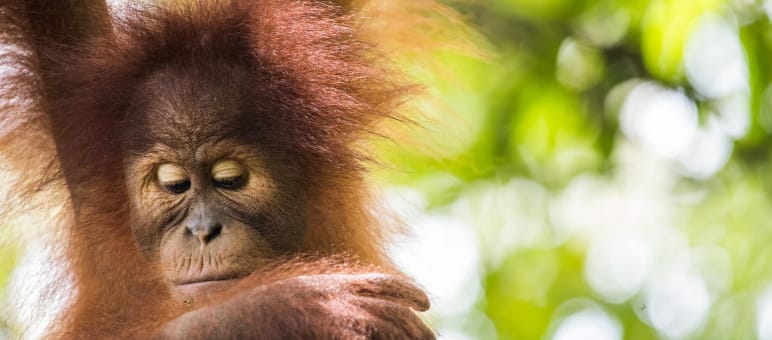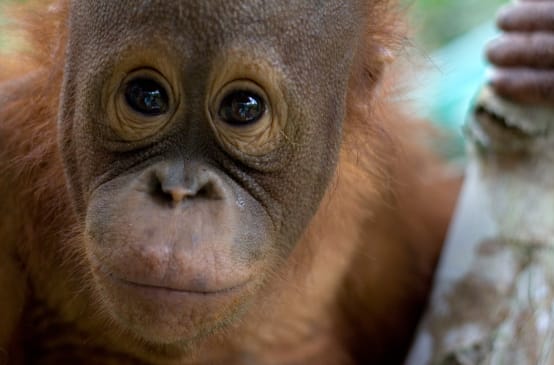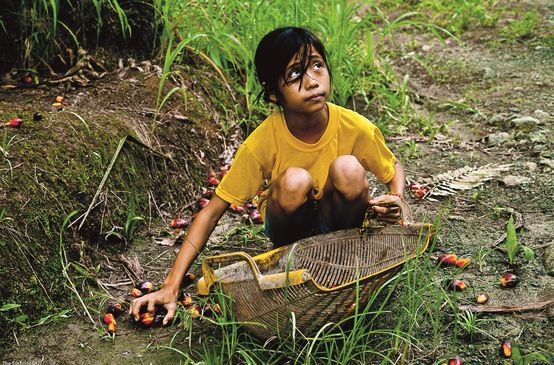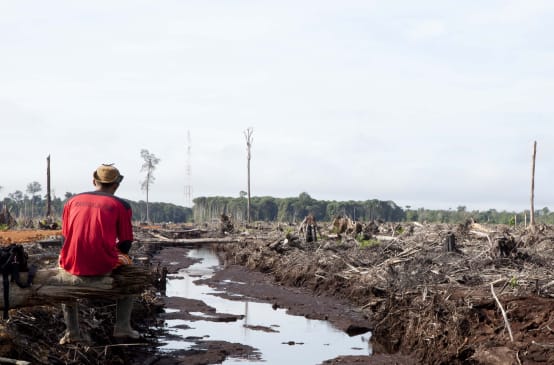
Indonesia: 14 years of impunity for arson in Tripa peat swamp forest
Indonesia: Ten years after the court ruling against Kallista Alam, a palm oil company that torched 1,000 hectares of wetland forest in the Leuser Ecosystem and is responsible for the deaths of orangutans, the company is finally willing to pay its fine – in installments. Environmental groups are demanding the rehabilitation of the Tripa peat swamp forest.
- Kallista Alam wants to pay fine in installments after 10 years of stalling
- Excerpt from the open letter to the Supreme Court in Jakarta
- Videos about the Tripa peat swamp forest
Ten years ago, a lawsuit against a palm oil company in Indonesia made headlines in more ways than one: The Tripa peat swamp forest, a haven for Sumatran orangutans, was torched in 2012. More than 100 fires were counted. The Swiss environmental foundation PanEco described the man-made disaster as “the worst forest fires since we began analyzing satellite images in 2000”. One hundred orangutans burned to death.
The palm oil company Kallista Alam, which sells palm oil to major corporations through traders in Singapore, was responsible for slashing and burning Tripa. According to Rainforest Action Network, Kallista Alam's customers include major corporations such as Nestlé, Mars and Cargill.
Tripa is part of the Leuser Ecosystem, the only place on Earth where endangered tigers, elephants, orangutans and rhinos of Sumatra share the same habitat. Thirty years ago, more than 3,000 orangutans lived here, but continued conversion to plantations has caused their numbers to dwindle to a few hundred individuals. 90 percent of the original 61,000 hectares of protected Tripa peat swamp forest are now oil palm plantations. Perhaps 200 of the endangered great apes still live in Tripa.
Indonesian groups initially failed to have the court stop Kallista Alam's suspicious permit for the protected area. But global campaigns, including our 2012 petition to save the last refuge of the orangutans, ultimately led to a sensational verdict: In 2014, Kallista Alam was found guilty of burning 1,000 hectares of peat swamp forest and was ordered to pay a heavy fine. Indonesian environmental groups described the court decision as “a victory for the people of Aceh and national and international environmentalists.” Rainforest Rescue also welcomed the ruling at the time. But to this day, justice has not been served.
Kallista Alam is one of 22 companies that have had to answer for forest and peat fires in court since 2013, 14 of which have been legally convicted. But only one company has paid a fine so far – and none has ever rehabilitated the area it destroyed.
Kallista Alam has now – ten years after the court ruling – begun to pay a small part of the fine in installments.
Indonesian environmental groups are strictly opposed to payment in installments, asserting that a decade of refusing to pay the fine should not be rewarded with concessions. Kallista Alam had tried for years to undermine the verdict by taking legal action. The Kallista Alam case is symptomatic of the state's attitude towards corporations that are legally convicted of environmental and other crimes.
Local communities and Indonesian environmental groups wrote an open letter to the Supreme Court:
“The government, as a trustee of nature, has the duty to prevent environmental damage in advance and to mitigate damage that has already occurred.”
The letter goes on to say:
“The enforcement of the verdict is a milestone in the enforcement of the law in the environmental crime sector in Indonesia. As representatives of the communities in Nagan Raya district and Aceh province, we are submitting some proposals to the Supreme Court.
PT Kallista Alam, must immediately fulfill its obligation to rehabilitate the burned area of 1,000 hectares in Pulo Kruet village, Nagan Raya district.
The rehabilitation of the 1,000 hectares must involve local communities and environmental organizations.”
- Original letter in Indonesian: 14 tahun kasus kebakaran hutan rawa tripa oleh pt kallista alam
- Map of Tripa: Primary forest gives way to palm oil
- Video documentary on Tripa (2010) 11 minutes, English
- Saving Leuser. Tripa. Video by Carlos Quiles (2012) 6 minutes, English:
This page is available in the following languages:

Indonesia: Protect the habitat of Tripa’s orangutans!
Officially, the peat forests of Sumatra are protected as a habitat for critically endangered orangutans. The encroachment of oil palm plantations must stop NOW!

Stop Cargill – Stop the fires in the orangutan forest
Cargill is selling palm oil derived from the destruction of the Sumatran rainforest, home of the critically endangered orangutans. In doing so the company is participating in the deforestation of one of the world's most important ecological systems. Demand that Cargill immediately stop trading with dirty palm oil

Save the last orangutan refuge
Flames, as far as the eye can see. More than 100 fires have blazed across Tripa within a week. The forest, one of the last refuges for the endangered Sumatran orangutans, is at great risk. If the accountable palm oil corporation is not stopped, they could disappear completely by the end of 2012. Please help the orangutans.

Palm oil
Palm oil is literally everywhere – in our foods, cosmetics, cleaning products and fuels. How could it come to this?